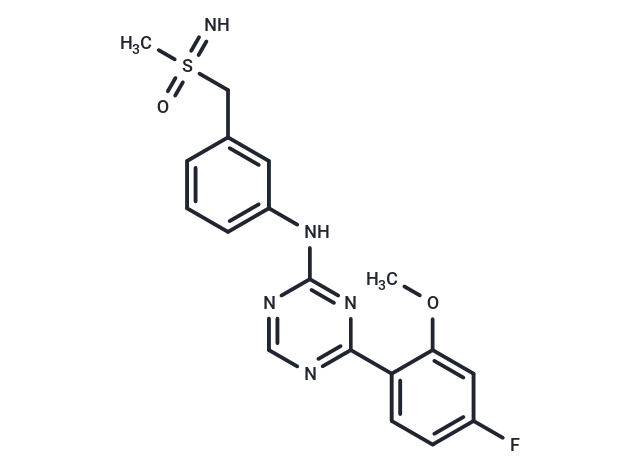Shopping Cart
- Remove All
 Your shopping cart is currently empty
Your shopping cart is currently empty

Atuveciclib (BAY 1143572) is a potent and highly selective PTEFb/CDK9 inhibitor with an IC50 value of 13 nm for CDK9/CycT1 and a selectivity ratio of 100 for CDK2, with highly bioavailable and orally available advantages.

| Pack Size | Price | Availability | Quantity |
|---|---|---|---|
| 1 mg | $81 | In Stock | |
| 2 mg | $123 | In Stock | |
| 5 mg | $213 | In Stock | |
| 10 mg | $347 | In Stock | |
| 25 mg | $645 | In Stock | |
| 50 mg | $859 | In Stock | |
| 100 mg | $1,180 | In Stock | |
| 1 mL x 10 mM (in DMSO) | $235 | In Stock |
| Description | Atuveciclib (BAY 1143572) is a potent and highly selective PTEFb/CDK9 inhibitor with an IC50 value of 13 nm for CDK9/CycT1 and a selectivity ratio of 100 for CDK2, with highly bioavailable and orally available advantages. |
| Targets&IC50 | Apoptosis:385 nM(AML cell lines), P-TEFb/CDK9:13 nM, Antiproliferative:310 nM(MOLM-13 cells), Antiproliferative:920 nM(HeLa cells) |
| In vitro | Atuveciclib (BAY-1143572) exhibits a potent and highly selective inhibitory effect on PTEFb-kinase, specifically against PTEFb/CDK9, in the low nanomolar range, demonstrating at least 50-fold higher selectivity over other CDKs. The compound effectively inhibits the proliferation of seven AML cell lines, both with and without MLL rearrangements, evidenced by a median IC50 of 385 nM (ranging between 230-1100 nM), and it also triggers apoptosis[1]. Furthermore, Atuveciclib (BAY-1143572) differentiates itself by showing significant selectivity against a broad array of non-CDK kinases, coupled with wide-ranging antiproliferative effects across various tumor cell lines indicated by sub-micromolar IC50 values. Notably, it leads to the concentration-dependent inhibition of RNA polymerase II phosphorylation, subsequently diminishing MYC mRNA and protein levels[2]. |
| In vivo | Atuveciclib (BAY-1143572) significantly enhances its effectiveness when used with various chemotherapeutics across different solid tumor models. Additionally, it reduces MYC mRNA levels in the blood cells of treated rats, suggesting the potential of using MYC as a pharmacodynamic marker during clinical trials. When administered orally once daily, Atuveciclib demonstrates efficacy as a single agent, achieving partial or complete remission in most AML (acute myeloid leukemia) xenograft models in both mice and rats, proving its potency and tolerability at certain doses. |
| Alias | BAY-1143572 Racemate |
| Molecular Weight | 387.43 |
| Formula | C18H18FN5O2S |
| Cas No. | 1414943-88-6 |
| Smiles | COc1cc(F)ccc1-c1ncnc(Nc2cccc(CS(C)(=N)=O)c2)n1 |
| Relative Density. | 1.36 g/cm3 (Predicted) |
| Storage | Powder: -20°C for 3 years | In solvent: -80°C for 1 year | Shipping with blue ice. | |||||||||||||||||||||||||||||||||||
| Solubility Information | DMSO: 100 mg/mL (258.11 mM), Sonication is recommended. | |||||||||||||||||||||||||||||||||||
Solution Preparation Table | ||||||||||||||||||||||||||||||||||||
DMSO
| ||||||||||||||||||||||||||||||||||||

Copyright © 2015-2025 TargetMol Chemicals Inc. All Rights Reserved.